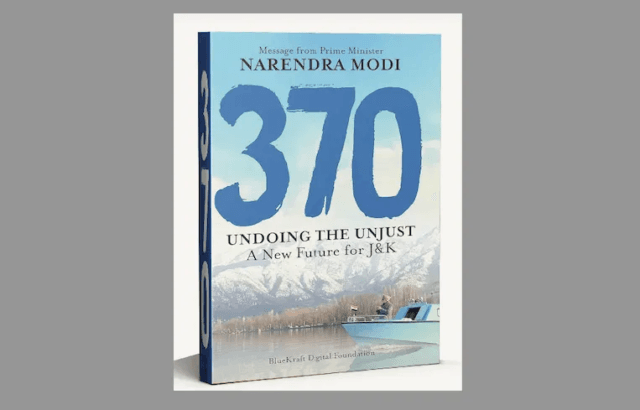Srinagar, Aug 25: The Rashtriya Swayamsevak Sangh (RSS), the chief architect of the abrogation of Article 370 of the Indian Constitution, was not aware of its abrogation until August 5, 2019, the day it was finally repealed, a book with the PM’s foreword reveals.
The book, ‘370: Undoing the Unjust, A New Future for J&K’, published by BlueKraft Digital Foundation with a foreword by Prime Minister Narendra Modi, on Page 413 mentions, “Just before Parliament assembled at 11 am, Modi made a few calls, one of which was to RSS Sarsanghchalak, Mohan Bhagwat, and told him, “Mohanji, Aaj hum kuch kar rahay hain. Dekhtay hain aagay kya hota hai (Mohanji, today we are going to do something. Let’s see what happens!)”
On August 5, 2019, the Bharatiya Janata Party (BJP)-led government in New Delhi abrogated Article 370 and downgraded J&K to two federally-administered union territories – J&K and Ladakh.
A political analyst in New Delhi said, “The book implies that PM Modi didn’t consult RSS earlier. Forget consulting, he didn’t even involve the RSS till the very last minute. Forget involving, the RSS wasn’t anywhere in the picture till August 5, 2019. This is something contrary to the popular perception that RSS was driving the abrogation of Article 370. It was a case of Modi holding cards close to his chest.”
For the RSS not being part of the game plan should come as a shocker to those who follow Sangh’s politics, particularly its politics on Kashmir, as Article 370 abrogation is the Sangh’s oldest ideological project, older than even Ram Mandir.
However, Seh Prant Sanghchalak (Vice President) of RSS in J&K Vikrant Sharma, told Greater Kashmir over the phone from Jammu that the abrogation of Article 370 had to be done by the government, not the RSS, which raised it as an issue decades ago.
“That PM Modi called the RSS Sarsanghchalak before the proceedings in the Parliament illustrates that the issue was not discussed with RSS due to secrecy,” he said. “As it was the second tenure of the PM Modi-led BJP government, everyone in the RSS had an idea that it would be done.”
Sharma said that the PM might not have discussed the issue with the RSS earlier, keeping in mind that if the information would leak, it could create an “unwanted situation” in the country.
While the RSS officially endorsed the Ram Janmabhoomi movement in 1984, the abrogation of Article 370 was its brainchild.
As early as the 1950s, soon after the article became a part of the Indian Constitution in 1950, it called for abrogating the semi-autonomous status of J&K.
After the Delhi Agreement between independent India’s first prime minister, Pandit Jawaharlal Nehru, and then J&K prime minister, Sheikh Muhammad Abdullah, the RSS in 1952 and its then political wing, the Bharatiya Jana Sangh (BJS), began openly protesting against Article 370.
The BJS had been established by Syama Prasad Mookerjee in 1951 with the RSS patronage.
The BJS’ inaugural manifesto in 1951-52 called for the complete integration of J&K with India.
Mookerjee’s well-known slogan, “Ek desh mein do vidhan, do pradhan, do nishan nahin challenge” (Two constitutions, two prime ministers, two flags in one nation won’t be allowed) was also directed at the scrapping of Article 370.
Mookerjee even travelled to Kashmir in 1953 to agitate over the demand, was arrested, and died in detention.
The RSS regularly wrote editorials in its weekly Organiser in the early 1950s that Article 370 was a “constitutional fraud” and a threat to national unity.
So, the first organised call by RSS for abrogating Article 370 can be traced to the early 1950s, particularly 1952, with the Jana Sangh’s campaign and Mookerjee’s movement against Kashmir’s special status.
Prof Hari Om Mahajan, a staunch rightwing ideologue who was expelled from the BJP in 2015 when he criticised the party for entering into an alliance with the People’s Democratic Party (PDP), told Greater Kashmir over the phone from Jammu that the BJP is the political wing of the RSS and abrogation of Article 370 was a sensitive matter.
“For a state maintaining a level of secrecy in such matters is important,” he said. “No one in the world thought Article 370 could be abrogated, yet when it was repealed, Union Home Minister Amit Shah had printed documents, which means some people might have even been held up while the documents were printed.”
Prof Mahajan said that the PM Modi-Amit Shah combination had given a new orientation to the entire system of secrecy.
“Such secrecy was also maintained at the time of demonetisation,” he said, and downplayed information shared in the book about RSS not having been in the loop regarding the abrogation of Article 370 and Article 35-A until August 5, 2019.
However, for a party that for 67 years spearheaded the campaign to scrap Article 370 and passed 27 resolutions on Kashmir since the 1950s to be sidelined like this regarding its oldest ideological project puts a question mark on how much confidence and trust Prime Minister Narendra Modi has in its leadership.








